|


info@jardis.de
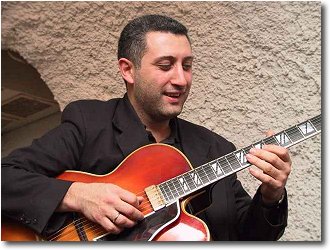 It's the
same old story. During the concert, they are all transfixed by his hands. Not
because they fly over the strings so fast the eye can hardly keep up. It's much
more the question to which there is no answer: how does an ex-boxer come to play
the guitar so brilliantly? And such darned difficult pieces, too, for example
those by Charlie Parker. It's the
same old story. During the concert, they are all transfixed by his hands. Not
because they fly over the strings so fast the eye can hardly keep up. It's much
more the question to which there is no answer: how does an ex-boxer come to play
the guitar so brilliantly? And such darned difficult pieces, too, for example
those by Charlie Parker.
How indeed? But hey, first catch this: he hasn't made his own
compositions much simpler, either. Lorenzo Petrocca , born in 1964 in the
deep south of Italy, has never done anything the simple way. Why should he, when
there's a complicated way. He's a friendly man. With bright eyes and a sharp
with that doesn't stop him from telling the odd pointed joke backstage. He moves
precisely and quickly, likes to laugh as much as he likes to eat, preferably
Italian, cooked by La Mamma, of course. Charlie Parker, how come?
Bird is the man who set the ball rolling. It's the early
80s.
Lorenzo has reluctantly hung up his boxing gloves. Simply hanging out at the
Italian dance&diner in Stuttgart-Degerloch doesn't do it for him. He borrows a
guitar and after only a couple of weeks is playing La Paloma and Sole
Mio like an old hand. As if he'd never done anything else, much to the
astonishment of his family.
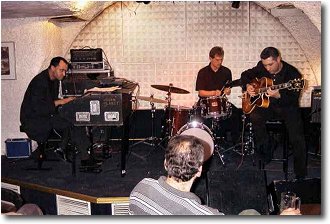 Lorenzo becomes good and fast. A few American GIs from the barracks next
door hear him and invite him to come and play. In the GI club, soul is the order
of the day. The pulse beats faster. Then, one evening after the gig, an American
music lover hands him a record. Have a listen to this. Si, sure. Lorenzo becomes good and fast. A few American GIs from the barracks next
door hear him and invite him to come and play. In the GI club, soul is the order
of the day. The pulse beats faster. Then, one evening after the gig, an American
music lover hands him a record. Have a listen to this. Si, sure.
The next day, Lorenzo is still poring over the record. He's had a listen.
20, 30 times. Over and over. It's Bird - and Lorenzo is bowled over. Listen to
that, he says, and can't believe what he's hearing.
Steeplechase,
for example. The man must have thought up that obstacle course with a good dose
of Godknowswhat in his brain, there's no other way of writing that sort
of stuff. And how do you play such challenging melody lines mode up of the
furthest apart notes in the chords?
With practice, like so much else. But not without swing. A tile layer who
doesn't swing won't lay a good floor. A baker won't bake good bread. Blacks
swing more than whites, say the men from ZIP. And - do you know a single Russian
who can swing?
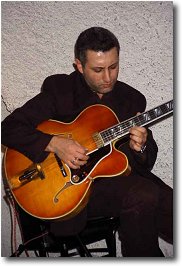 But Italians, yes. Lorenzo takes Parker aport. Devours his music and
everything about him. Opens up horizons, discovers links. From Blues and Bebop,
from Klook to Dizzy. Monk to Pettiford, Powell,
Roach, Hawk, Wilson, Carter, Christian,
Eldridge. And again and again he comes back to the central meeting point,
Minton's Playhouse, that foyer in Cecil's Hotel in 118th Street West, right
in the middle of Harlem. When he finally makes his pilgrimage there, the place
has long since closed its doors and Cecil's Hotel is a shelter far the homeless,
where jazz no longer has a place. But Italians, yes. Lorenzo takes Parker aport. Devours his music and
everything about him. Opens up horizons, discovers links. From Blues and Bebop,
from Klook to Dizzy. Monk to Pettiford, Powell,
Roach, Hawk, Wilson, Carter, Christian,
Eldridge. And again and again he comes back to the central meeting point,
Minton's Playhouse, that foyer in Cecil's Hotel in 118th Street West, right
in the middle of Harlem. When he finally makes his pilgrimage there, the place
has long since closed its doors and Cecil's Hotel is a shelter far the homeless,
where jazz no longer has a place.
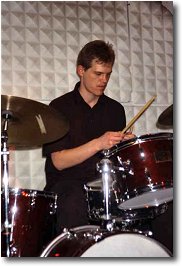 Bebop, on the other hand is alive and kicking where traditions are well
looked after. Lorenzo dedicates the best part of his heart to it, and soon a
second heart joins him - that of his brother Davide. He plays bass.
Lorenzo infects him with his love, but then that's another story. Bebop, on the other hand is alive and kicking where traditions are well
looked after. Lorenzo dedicates the best part of his heart to it, and soon a
second heart joins him - that of his brother Davide. He plays bass.
Lorenzo infects him with his love, but then that's another story.
In as little as ten years, the little Italian has turned into a great
musician. A guitarist who will never renounce Bebop, but also will never forget
his native soil. Along with "Steeplechase",
he has long since learned to play "Billie's
Bounce" and everything
else by Bird. When he feels like it. But he's just as happy playing Antonio
Carlos Jobim, Billy Reid, Cole Porter, Dizzy Gillespie,
Thelonious Monk and Lorenzo Petrocca. He is a guitarist of whom
some say there's practically nothing he can't play. You can easily get that
impression.
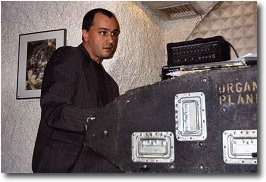 He works with Benny Bailey and Anne Sophie Mutter.
Accompanies Caterina Zapponi and Al Martino. Holds his own against
Herb Ellis, rides out Tony Scott. Martin Drew, Oscar
Peterson's most meticulous drummer, introduces him into the circle of the
European jazz élite. Monty Alexander - who himself played in Minton's
Playhouse - takes him into the recording studio. He works with Benny Bailey and Anne Sophie Mutter.
Accompanies Caterina Zapponi and Al Martino. Holds his own against
Herb Ellis, rides out Tony Scott. Martin Drew, Oscar
Peterson's most meticulous drummer, introduces him into the circle of the
European jazz élite. Monty Alexander - who himself played in Minton's
Playhouse - takes him into the recording studio.
That would be the end of the story, if it weren't for one development. At
a festival, Lorenzo hears the trio of organist Dr. Lonnie Smith. And
knows straight away that he also wants to work like that, maybe not for ever,
but every now and then. The colleagues of his choice are first choice: Alberto Marsico
, a B3-magician of the first water, and drummer Armin
Fischer, who builds his springy rhythm on Marsico's bass foundation. Against
this impeccable background, Lorenzo Petrocca can let his hands fly until the
audience dissolves in a chorus of "Ahs" and "Ohs". And he used to
be a boxer?
So what if the Wurttemberg boxing champ's title is a thing of the
past. Today, Lorenzo Petrocca is a champion of the guitar. His Blues can
be more intensive than any, the warm passages breathing the long history of
jazz. He is a musician whose greatest asset lies in his respect for the past. He
acts on what he knows.
The rest follows automatically.
Woomy Schmidt
(English translation by Jan
Wheeler)
Photos are about
Lorenzo Petrocca Trio on March 31, 2001
©
Marcel Hasübert
Insert an opinion
This page has 4.263 hits
Last Modified Date: 15/01/2005

|
|

